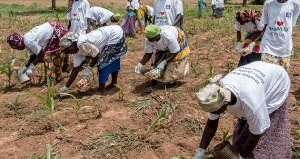In this current neoliberal era coupled with food scarcity and a rising human population in Sub-Sahara Africa, food production has become a central theme for governments in this region of the world. When campaigning for the presidency in opposition in 2016, Ghana’s President Nana Akufo-Addo made a strong case for agriculture. He criticized is predecessor for neglecting the agricultural sector. Mr Akufo-Addo claimed the then government reduced budgetary allocation for agriculture from 3% in 2009 to 1.1% in 2016, allowing for the fall of the sector from 7.4% at the end of 2008 to 0.04% in 2016. At the Famer’s Day celebration held in last December in the city of Kumasi, President Akufo-Addo reechoed his commitment to develop the agricultural sector.
“I wish to state that this government is convinced that agriculture is a key driver of growth and development. Modernization of agriculture will remain a priority of the government. Our prescription for tackling the problems of the agricultural sector is to operationalize a comprehensive plan to enhance food security, improve farm productivity, strengthening linkages with industries, and thereby creating jobs, improving rural livelihoods and wealth for all Ghanaians. The trust of the key policies in pursuance of the objectives is to promote agribusiness by placing emphasis on agricultural value chain development in partnership with the private sector. We believe this is the way to transform Ghana’s agriculture as we target to move away from subsistence to a business-centered approach to agriculture “.
Agriculture is one of the key sectors holding the Ghanaian economy. However, the sector’s contribution to the economy has been declining off late. It reduced from 23 percent to Gross Domestic Product (GDP) in 2012 to 22 percent in 2013. It further declined from 20.3 percent in 2015 to 19.1 percent in 2016. Indeed, making the agricultural sector vibrant will require a political decision. Coincidentally, the political party that brought Mr Akufo-Addo to power (the New Patriotic Party) is centre-right. The party has strong faith in the market economy and private investment. It is hence not surprising to hear the president say the way to transform Ghana’s agriculture is to invite investment from the private sector.
With the help of private capital, Ghana will promote agribusiness by placing emphasis on agricultural value chain development. Ghana is targeting to move away from subsistence agriculture to a business-centred one. The plan hence is to shift from subsistence to industrial agriculture, moving the country from growing for consumption to growing for exchange. Transitioning from an agrarian to an industrial country means a fundamental change in the social structure of the population. Especially when the transition is being facilitated by private capital, the likelihood of private interest prevailing over public interest is high. Private investors are interested in returns on their capital. Their goal will be to produce crops that will fetch profit.
Investors will use the rhetoric of local food security in order to get their proposals approved. But monoculture style of farming will be common particularly cash crops that could fetch revenue. This directly affects staple crops and subsequently endangers food security of the country. Also, there will be issues relating to land deals. Rural dwellers have direct ties with their land. It is the source of their livelihood. Industrial agriculture requires vast tract of land for cultivation. To acquire the land, some people would have to be dispossessed particular those who live in proximity to vital resources for farming such as water, fertile soil among others.
The primary logic of capital is profit. Indeed, business people will tell you it doesn’t make sense to invest in a venture that doesn’t yield profit. According to the Emeritus Professor of Development Studies at the University of London Henry Bernstein, agriculture is a venture with obstacles that delay in yielding returns for capital. For example, if you plant a cash crop like cocoa, you have to wait for longer period before harvesting. Also, the wellbeing of the cocoa will depend on the fertility of the soil and even the weather. These Bernstein argues make investors cautious in agriculture. But with the transfer of science and technology in agriculture and improvement in soil science and other factors, some of these obstacles have been conquered. There are now drought resistance, high yielding short-term seeds, Genetically Modified seeds and other inventions that have made agriculture attractive to corporations.
Renowned agrarian Professor Philip McMichael conceptualizes in his third food regime analysis that the current neoliberal globalization project has surrendered the food system of the world to corporations. Corporations are taking advantage of neoliberal policies of privatization, financialization, public-private partnership among others imposed on developing countries by the World Bank and the International Monetary Fund to invest in agriculture. This is having severe impact on the rural population as majority of them are separated from their means of production as a result of corporate dispossession.
Corporate farming starts with mouthwatering promises mostly from the government about how it would create good jobs and income as well as modernizing agriculture for the country especially for the rural population. But the promises turn out not to be honoured. Corporate farming ends up taking over the means of subsistence of small farmers. Even the World Bank who advocates for private investment in agriculture is beginning to worry about the benefits of such investments to rural dwellers. The bank’s 2011 report titled Rising Global Interest in Farmland: Can it Yield Sustainable and Equitable Benefits? Looked into case studies in 18 developing countries including five African cases – the Democratic Republic of Congo, Liberia, Mozambique, Tanzania and Zambia. The report found no substantial benefit for rural residents. It rather unearthed displacement, marginalization and environmental externalities in the local communities.
In a 2012/2013 case study in three Latin American countries–Guatemala, Colombia and Paraguay by the anti-poverty campaigner Oxfam to look at how private investment in agriculture is benefiting the rural population, damning consequences were revealed. The study found that United States-based agribusiness companies have taken advantage of the commitment of governments of these countries to allow private investment in agriculture. The investors’ promises of creating jobs and modernizing agriculture to benefit the rural population were not met. They rather concentrated on mechanizing their farms to produce mono crops for export. The worrying part of the study is that the companies used clandestine methods to acquire vast tract of lands even when the laws of the country prohibit such acquisition.
To avoid land ownership concentration, Colombia has a limit a person or an entity can acquire. But the study documents how Cargill, a United States -based agribusiness corporation evaded the rules by creating 36 shell companies. Each of the shell companies then acquired less than the legal limit. In the end, Cargill was able to acquire over 52,000 hectares of land through this dubious means, displacing many smallholder farmers. In Paraguay and Guatemala, the study showed how expansion of large-scale monocropping plantations is competing for land with smallholder farms that produce basic staples for households’ consumption.
To add insults to injuries, the governments of these countries were found to have granted tax holidays to these companies as well as investing massively in road networks to connect the plantations to the cities, allowing the product to be easily shipped abroad. What is striking about this Oxfam study that has resemblance with what Ghana is about to do is that it shows clearly that government facilitation of private capital into agriculture ends up benefiting the investors while citizens, especially those in the rural areas fall back deep in poverty.
There are lessons Ghana can learn. The country should understand that no matter how it sees smallholding farming as irrational, it still plays a vital role in the economy. Peasants don’t grow for export. They feed both the rural and the urban population of the country. To modernize Ghana’s agriculture, the government should put special emphasis on the welfare of the rural population. First, the goal should be to grow more staple crops than mono-crops. There should be strong laws and enforcement coupled with constant and vigilant monitoring of agribusiness investors in order for them to respect and abide land laws to avoid dispossession of the peasant population.
Issaka Adams
The writer is a student at the International Institute of Social Studies of Erasmus University in The Hague, The Netherlands.
Email: 467377ia@eur.nl
Opinions of Thursday, 1 March 2018
Columnist: Issaka Adams















